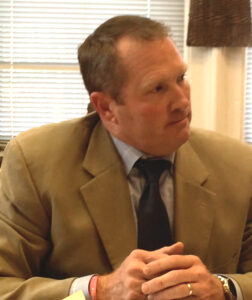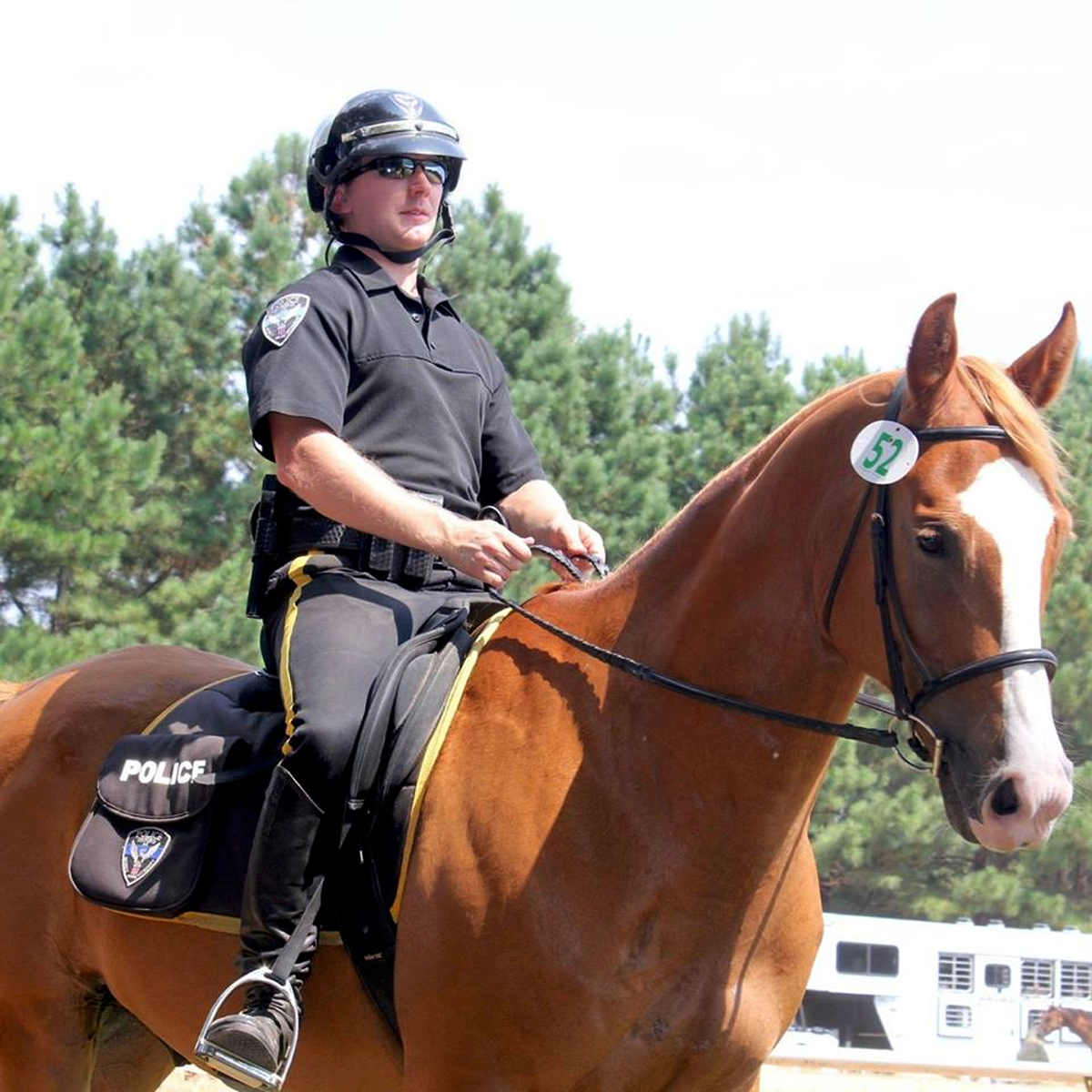The Oxford Police Department recently began taking steps toward creating an action plan in the event of a riot.
Over 50 years after the historic James Meredith Riot of 1962, Major Jeff McCutchen of the Oxford Police Department said the recent violence in Ferguson, Mo. and Baltimore, Md. prompted the department to begin planning in the case of such an event in Oxford.
“There have been documented incidents that have happened that we’ve been fortunate that things didn’t spin out of control,” McCutchen said.
However, Oxford Police Chief Joey East believes that the public should understand that there are major differences in a crowd’s legal right to demonstrate and/or protest and that of a riot.

“We have received most of our equipment and are currently scheduling training,” East said. “As far as crowd control goes, we are familiar with this and do it on a regularly basis in the downtown area and during football season and other events like Double Decker.”

“It was a war,” Meek said, “nothing short of a warzone.”
After witnessing the chaos that cost two civilians their lives and injured over 300 others, Meek said he was surprised to learn that local police had no concrete riot plan in place. “It took 30,000 troops to contain the Ole Miss riot. That is not likely to happen again but times are such that every community needs to be prepared for crowd control that would become something more,” Meek said.
With this, Chief East agrees and has put forth training and other programs to head off any problems that may arise… for any reason.

“We have become much more successful since adding the Mounted Unit. The crowds seem to move easier and with less negative emotions toward us. OPD is prepared for most crowds. Like anything in life we could be caught with crowds larger than we can handle, but if that happens we will follow protocol and contact our surrounding agencies for assistance along with our state agencies,” East said.
According to Meek, in his lifetime there have been several “almost riots” since 1962. McCutchen said even the tension surrounding the recent removal of the Mississippi state flag from the Ole Miss campus had riot potential, putting his unit on high alert.
If a riot broke out in Oxford today, McCutchen said that without a plan, police would be forced to act on their feet using their best judgment. McCutchen expressed concern about this prospect in light of recent media scrutiny toward law enforcement.
“A decision that you have seconds to make goes worldwide and everybody has the chance to look at it and decide your fate,” McCutchen said. “I can’t imagine the media scrutiny that would happen when people would come and go, ‘Really, guys? It’s 2015 and you don’t have a plan for this?’”
McCutchen said the department would rely heavily on any advantage they might gain using the mounted patrol unit. Five of the eight horses in the unit received riot training over the last few years, compared to the three or four officers trained in September at a course in Tupelo.

Officer David Misenhelter, head of the mounted patrol unit, said the horses and their riders attended Mardi Gras School in Biloxi where sessions were held yearly – over the course of a few days – to teach 40-60 horses and their riders how to handle different scenarios by using the Mardi Gras crowds to simulate a riot. The teams learn everything from standard formations and crowd management to desensitizing the horses to flying objects and gunfire.
Misenhelter said that although the horses have the necessary training to confront a riot situation, the unit cannot safely deploy at this time because the horses are also unequipped. He hopes that through city grants and the generosity of their non-profit support group, the mounted patrol unit may soon get protective gear for the horses as well as the officers.
So far, the gear has been McCutchen’s main focus. According to him, the department has ordered and received standard riot equipment including helmets, shields and batons. This, McCutchen said, is for the protection of the officers and would allow them to hold their ground against an angry crowd.
However, McCutchen said that even with the right gear, officers could still potentially make a bad situation worse without proper training. Though he has yet to receive riot training himself and knew little about the process, McCutchen said he intends for the officers who attended training two months ago to eventually teach the rest of the department. McCutchen said he hopes that by next year the department will have a standard operating procedure in place.
McCutchen said just because Oxford has seen little violence since the 1962 riot does not mean police can afford to “hide in a closet” and hope it never happens.
“More than anything what we learned from that is it can absolutely happen in Oxford,” McCutchen said. “Anything can happen in Oxford.”
The riot of 1962 began as a routine pep rally, marked by the cheers and “hotty toddy” chants of college students, according to Meek. It was not until a flying bottle broke over a marshal’s helmet that Meek, who was standing at the front of the crowd, turned and realized he no longer recognized any of the people behind him.
“When darkness came the students left and the people who came had guns,” Meek said.
In his book of photography, “Riot: Witness to Anger and Change,” Meek’s photos show the extent of the damage, the clouds of tear gas and burnt remains of vehicles caused by the riot.
Now that the gear has arrived and until the specific training has been completed, McCutchen said there are a few ways in which the department would try to control an immediate situation. According to McCutchen, the key to crowd control is to get as many officers as possible to quarantine the area as quickly as possible and to try to bring emotions down.
McCutchen said the department plans on hiring five new officers within the next year, at which point the force will be operating with a full staff for the first time in about two years, giving them an advantage in numbers.
Other control tactics McCutchen named included keeping an eye out for instigators and making a few arrests, or, if that fails, trying to find someone who can communicate with the crowd.
The aim, McCutchen said, is to corral the mob to a safe area to avoid as much damage to businesses and citizens as possible while still leaving an escape route for the crowd to move safely. Much of this, he said, is very dependent on where and when the riot breaks out, but the department currently has no plan regarding safety routes in the different areas of Oxford.
Things change if members of the crowd are armed, turning a riot situation into a deadly force situation, in which case, McCutchen said, plastic riot gear becomes obsolete.
According to McCutchen, officers in such situations are authorized to use deadly force if necessary to protect themselves as well as other protestors. This, McCutchen said, was the worst case scenario, and the purpose of riot training is to avoid using unnecessary force.
“You can take a lot of violence without having to use violence,” McCutchen said.
One thing McCutchen said he learned from his reading about the riot was that there were several warning signs which, had they been caught, might have prevented the eventual outcome.
“The best thing we can do is be preventative in our measures,” McCutchen said. “That includes being community-oriented with our citizens, with our locals and with our college students so that this doesn’t jump off.”
McCutchen said he hopes that the department has built up a good working relationship with the community so that disgruntled citizens feel free to communicate with the police.
According to Meek, however, everyone around him saw the potential for the riot of 1962 even before it broke out, but he said he did not know of any way it could have been prevented. Once it happened, he said, it was out of anyone’s control.
“Having appropriate equipment and training is important in times of crises,” he said.
Mary Cloud Taylor is a journalist at Ole Miss and student in the Meek School of Journalism and New Media. She can be reached at mctayl01@go.olemiss.edu.
Follow HottyToddy.com on Instagram, Twitter and Snapchat @hottytoddynews. Like its Facebook page: If You Love Oxford and Ole Miss…

